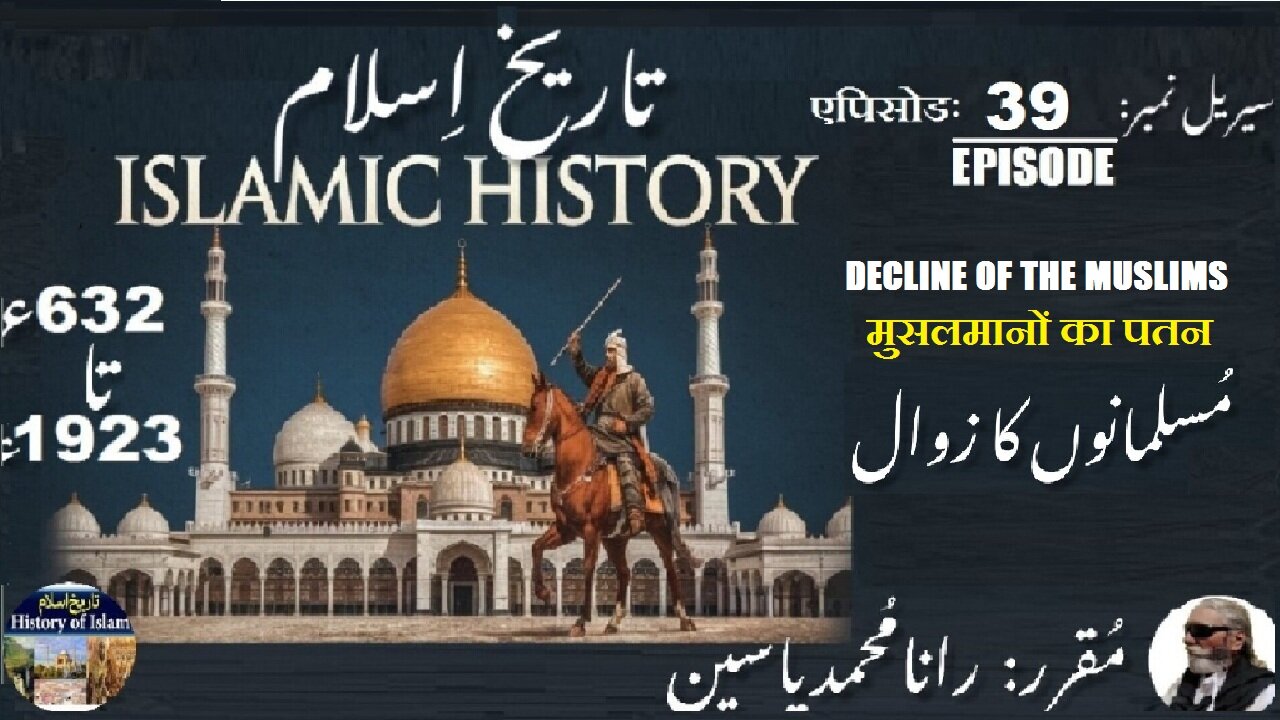Premium Only Content

Islamic History Episode-39-एपिसोड Decline of the Muslims मुसलमानों का पतन مسلمانوں کا زوال
@islamichistory813 #islamichistory632-1923 #series #islamichistoryseries #Historical #Episodes #culturaljourneys #islamichistoryfacts #storiesofislamichistoryinurdu #stories #episode39
Islamic History Episode-39-एपिसोड Decline of the Muslims मुसलमानों का पतन مسلمانوں کا زوال
Asslamoalaikum, sisters, brothers friends and elders,, we started this YouTube series delves on the subject Islamic history (632-1923), We are describing its evolution from after Death of Hazrat Mohammad (Peace be upon him) until Second World War untill last Sultan of Sultanate Osmanya. Each episode will provide a detailed information of significant events, cultural developments, and influential figures that shaped the Islamic world during this pivotal period. Please watch complete episodes as we are describing indetail of history of Islam that have contributed to the modern landscape of Islam.
After the death of Prophet Muhammad (peace be upon him) in 632 CE, the Muslim community was faced with the challenge of selecting a successor. Following the Prophet's guidance, the Ansar (supporters) and Muhajirun (migrants) gathered to elect Abu Bakr as the first Caliph. Abu Bakr's leadership ensured stability and continuity, and he successfully united the Arabian Peninsula under Islamic rule. Umar ibn Al-Khattab succeeded Abu Bakr and expanded the Islamic empire, conquering Syria, Palestine, and Egypt. Uthman ibn Affan, the third Caliph, oversaw further expansion, but his reign was marred by internal conflicts.
Hazarat Uthman's RA assassination (SHAHADET) led to the First Fitna, a civil war that resulted in Hazrat Ali ibn Abi Talib RA, the Prophet's cousin and son-in-law, becoming the fourth Caliph. However, Muawiyah ibn Abu Sufyan, the governor of Syria, challenged Ali's authority, leading to a prolonged conflict. Ali's assassination in 661 CE marked the end of the Rashidun Caliphate. Muawiyah established the Umayyad Caliphate, with its capital in Damascus. The Umayyads expanded the empire, conquering North Africa, Spain, and Central Asia.
In 750 CE, the Abbasid Revolution overthrew the Umayyads, establishing a new caliphate with its capital in Baghdad. The Abbasids oversaw a golden age of Islamic civilization, marked by significant cultural, scientific, and philosophical achievements. Caliphs like Al-Mansur, Al-Mamun, and Al-Mu'tasim patronized scholars, translating Greek and Persian works into Arabic. The Abbasids also expanded the empire, conquering eastern Europe and establishing trade networks.
In 909 CE, the Fatimid Caliphate emerged in North Africa, challenging Abbasid authority. The Fatimids conquered Egypt and established Cairo as their capital. However, the Fatimids declined, and the Ayyubid dynasty took control. In 1291 CE, the Ottoman Empire, founded by Osman Bey, began its expansion. The Ottomans conquered much of the Middle East, North Africa, and Eastern Europe, establishing their capital in Istanbul.
In 1258 CE, the Mongols, led by Hulagu Khan, sacked Baghdad, marking the end of the Abbasid Caliphate. The Mongols devastated much of the Islamic world, destroying cities and institutions. However, the Mongols eventually converted to Islam, and their Ilkhanate dynasty patronized Islamic arts and culture.
Following the Umayyad conquest of Spain, Islamic civilization flourished in the Iberian Peninsula. Cities like Cordoba, Granada, and Seville became centers of learning and culture. Scholars like Ibn Rushd (Averroes) and Ibn Arabi made significant contributions to philosophy, medicine, and astronomy.
The Crusades, launched by European Christians, aimed to reclaim the Holy Land from Muslim rule. The Crusades resulted in significant bloodshed and destruction. Muslim leaders like Saladin and Baybars led successful counter-attacks, recapturing Jerusalem and defeating the Crusaders.
In 1526 CE, Babur founded the Mughal Empire in India, which became a center of Islamic culture and learning. The Safavid dynasty, established by Shah Ismail in 1501 CE, unified Persia (modern-day Iran) under Shia Islam.
The rise of European colonial powers led to the decline of Islamic empires. The Ottoman Empire faced significant challenges, including the loss of territories and influence. The British East India Company conquered India, ending Mughal rule. The Safavid dynasty was eventually replaced by the Qajar dynasty.
During World War II, many Muslim-majority countries were colonized or occupied by Axis or Allied powers. The war weakened colonial powers, paving the way for decolonization.
Allah Hafiz
-
 16:19
16:19
ISLAMIC HISTORY
15 hours agoIslamic History Episode 137 Mukhtar's claim to prophethood मुख्तार का दावा مختار کا دعوئ نبوت
1 -
 2:42:21
2:42:21
RiftTV/Slightly Offensive
8 hours agoLAPD Shot ME?! Rioters RAN OVER, US Attacking Iran? | The Rift | Guest: Anna Perez + Braeden Sorbo
83.3K27 -
 2:12:14
2:12:14
TubButter
1 day ago $0.99 earnedMy aim is sharper in 1440P Warzone! (Maybe). 😉 Live now! #Warzone #1440p #FunnyFails #TubButter
43.9K -
 1:49:01
1:49:01
The Confessionals
13 hours agoThe Invisible War They Don’t Want You to See (It Didn’t Start With You)
35K6 -
 1:16:48
1:16:48
Adam Does Movies
1 day ago $0.29 earnedMovie Hangout + Ask Me Anything - LIVE!
22.9K2 -
 2:01:11
2:01:11
Anthony Rogers
1 day agoEpisode 371 - Exposing the Devil's Playbook
25.1K4 -
 2:16:42
2:16:42
RJTWIN
4 hours ago🔴LIVE - 2 Men, 0 Plans | Warzone | Clean Content - !blerp !discord !rumbot
6.85K -

The Sufari Hub
5 hours ago🔴LIVE | DUMB AND DUMBER TAKEOVER THE ZOMBIE APOCALYPSE | DAY 7 HERE WE COME
4.89K -
 9:42
9:42
The Shannon Joy Show
7 hours ago🔥 AI Tyranny Unleashed — Trump & Gates Just Sold Us Out 🔥
13.7K8 -
 3:10:13
3:10:13
blackfox87
5 hours agoFortnite Assemble! | #DisabledVeteran
10.6K